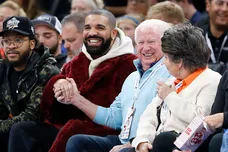The term renaissance man gets banded about a lot in cultural discussions but it’s one that fits Donald Glover like a glove. Just like the historical figures that the phrase was coined to describe, the 35-year-old writer, rapper, actor, director, singer, comedian, producer and occasional DJ keeps more plates spinning than practically any other modern artist. Enough to make anyone’s work-rate or personal achievements feel inadequate, there are certainly performers that have made more money than him or possess more of a responsive business acumen but there are none that are as committed to diversifying their creative portfolio than Glover. Although he made his bones in the entertainment world well over a decade ago, as a writer for 30 Rock, the past two years have served as a time for the man also known as Childish Gambino to finally get the recognition he deserves for his thought-provoking mind.
Between the George Clinton-style funk of his 2017 LP Awaken My Love, the runaway success of his single “This Is America” and the outpouring of adoration that his FX show Atlanta has received from both critics and audiences, Donald Glover has been instated as one of the most important creators of this era. Declared as “The King Of All Media” by FX CEO John Landgraf, the revelation that Atlanta’s third season has been formally postponed to 2020 left a cavernous hole in millions of viewing schedules. Citing issues such as “injuries” and bereavement due to the untimely death of Glover’s father, Landgraf enlisted the age-old analogy about patience being a virtue to clarify what’s happening:
“One thing that’s just a reality of television today is you just have to wait. We didn’t get back on an annual cycle on Atlanta. I wish for the fans as well as for us that we could get everything back on an annual basis. You just have to make a decision about quality over quantity.”
Kevin Winter/Getty Images
While it’d be easy to discount the network head’s comment as a just a way of parrying off reporters, the notion of waiting for greatness is one that resonates in the case of Atlanta. When it comes to the mesmeric world of Ern, Van, Paperboy, Darius and the colourfully fleshed-out ensemble characters that inhabit it with them, its consistency in quality has made it the project that outshines all of Glover’s other pursuits. Save for the universal acclaim that greeted “This Is America” and its accompanying visuals, the response to Glover’s musical output under his Gambino alias has been notably split. On his debut album Camp, Glover built on the quick-witted punchlines and metaphorically rich bars that defined his I Am Just A Rapper mixtape series and applied it to crisp production from future Academy Award nominee Ludwig Goransson. Though it did have its merits and standout tracks, the response was mixed to say the least, with Pitchfork even vilifying Glover’s attempts to move into rap in a scathing 1.6/10 review.
When his sophomore effort Because The Internet arrived two years later, it did so with a new emphasis on intertwining a personal narrative with commentary on our evolving digital age and all of the problems it brings about but the response was similarly polarizing. Prefaced by the abstract short film Clapping For The Wrong Reasons, this mixture of surreal visuals and critique of humanity’s direction that was produced by the combination of the movie and the record now feels like a forerunner to what he’d achieve on his FX show three years later.
In the post “This Is America” age, Gambino’s musical talents are finally being held in the same lofty esteem as his abilities as a writer, and it all comes back to further exploration of what makes Atlanta such vital television. Arresting and terrifying all at once, the feverish imagery of the breakout track’s visuals and its satire of the modern world seemed revolutionary to some but was common ground to those familiar with Glover and director Hiro Murai’s lauded series. Where “This Is America” distilled these ideas down to shock value, Atlanta has allowed the duo and their creative team to turn these concepts into something far more robust.
Slick, stylish and absurd in all the right ways, the tale of Princeton dropout Earn’s quest to reach the top of the music industry by managing his viral trap-rapper cousin Alfred “Paper Boi” Miles may seem straightforward enough but has yielded some of the finest television of the last ten years. In the press run for its first season, Glover cited one revolutionary show as its primary influence:
“Twin Peaks was this show I really liked...it was very strange and had a lot of almost, for Millennials, was Lost-esque at the time. A lot of questions would come up with no real answers and there was a mystery, and I kind of wanted to do a show that had those elements but for people who were rappers.”
While that lineage can be traced in its fusion of American life and surrealism, David Lynch’s groundbreaking show and Glover’s masterpiece differ in several crucial ways. For the most part, everything that occurred in Twin Peaks was used to propel the plot forward and bring us closer to uncovering one overarching mystery. On the other hand, Atlanta uses the incongruity of seemingly random events or alternate realities in order to explore the unpredictability of the day-to-day life of a young black man or woman in the city. Often classed as a comedy, this genre description only provides part of the picture and disguises their ability to broach weighty social issues in a uniquely accessible way.
Take the episode “B.A.N,” for example. Centered around the programming and commercials of the fictionalized “Black American Network,” this episode diverted from the main plot to make us viewers of “panel show” Montague. After tweeting that he wouldn’t sleep with Kaitlyn Jenner, Paper Boi found himself embroiled in controversy and had to state his case to the show’s hostile host and white trans activist Dr. Deborah Holt. In a later section, Paper Boi is exposed to Antoine Small; a black teenager that identifies as a “trans-racial” 35-year-old white man from Colorado. By the time that Paper Boi and Holt find common ground, Glover and his team had broached diverse issues surrounding cancel culture, disconnects between races and the Rachel Dolezal controversy in a unique and refreshing way that his music simply could not.
Throughout season 1 and 2, this is a feat that Atlanta has pulled off without compromising on the delicate balance between its grounded setting and the otherworldliness of some of the encounters therein. From pertinent topics such as institutionalised poverty, social inequity, ever-present danger and the pursuit of success in America that defined "Sportin’ Waves’," "FUBU," "Go For Broke," "Juneteenth" and "Woods," to the perils of Instagram flexing that gave way to Marcus Miles’ invisible car or pics with a Drake cardboard cut-out in "Champagne Papi" and "The Club" respectively, the reason that Atlanta stands tall above Glover’s other work is that every frame or piece of dialogue seems vital. In his studio albums, there’s been a recurring problem with standout tracks being spaced out between filler or partially-realized tracks that don’t land with the efficacy that he planned. With Atlanta, every single episode broadens the viewer’s mind while entertaining all the same. No other modern show with a similar demographic would veer from the mockery of social media’s "aspirational" elite that is "Champagne Papi" before bringing us into the ghoulishly sinister world of "Teddy Perkins" the very next week but Glover and co. pull it off due to its unmistakable tone.
If Black Panther was a sterling example of Afrofuturism in cinema, Atlanta performs a similar function for the small screen in that it takes the expectations of its premise and far exceeds its predisposed boundaries. When you make a television show about young black men trying to make something of themselves in the dangerous inner-city, it’s expected to be in the gritty vein of Empire or Power, rather than carried off with the experimental edge of Atlanta. Within its two seasons, Glover has produced something that uses the classic rags-to-riches journey to expand minds and shed light on the nature of the world around us in innovative ways that emerge through its visuals and plotline alike. Although we may be waiting until 2020 for the next installment, rest assured that it will be just as uncompromising and insightful as what came before and will continue to solidify itself as its creator’s finest work.







